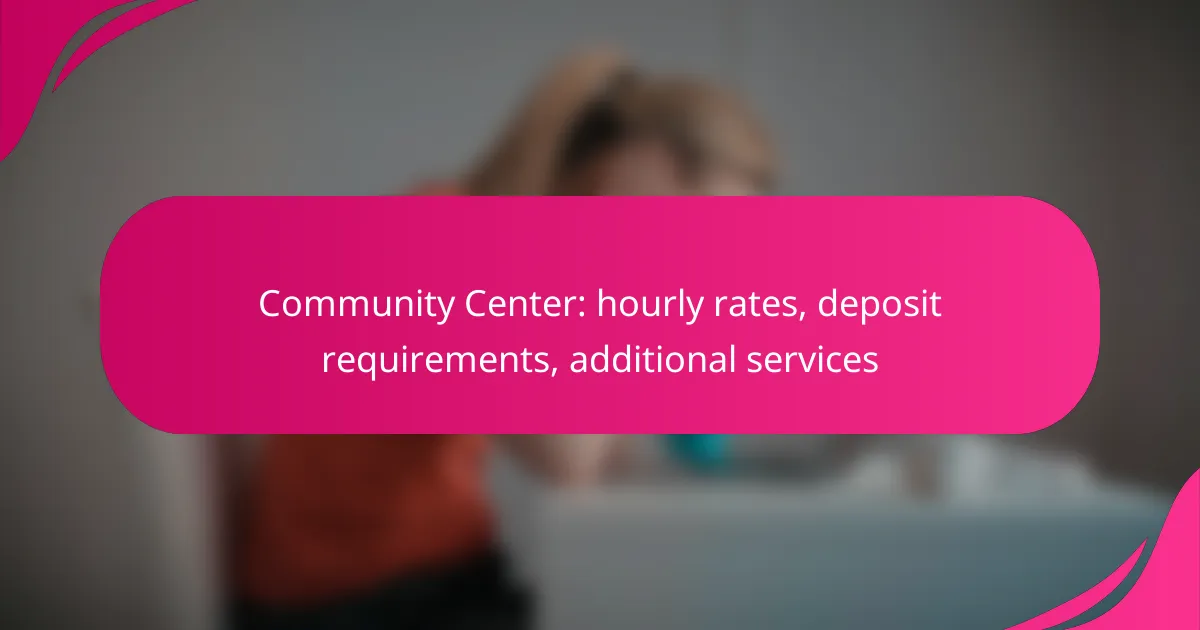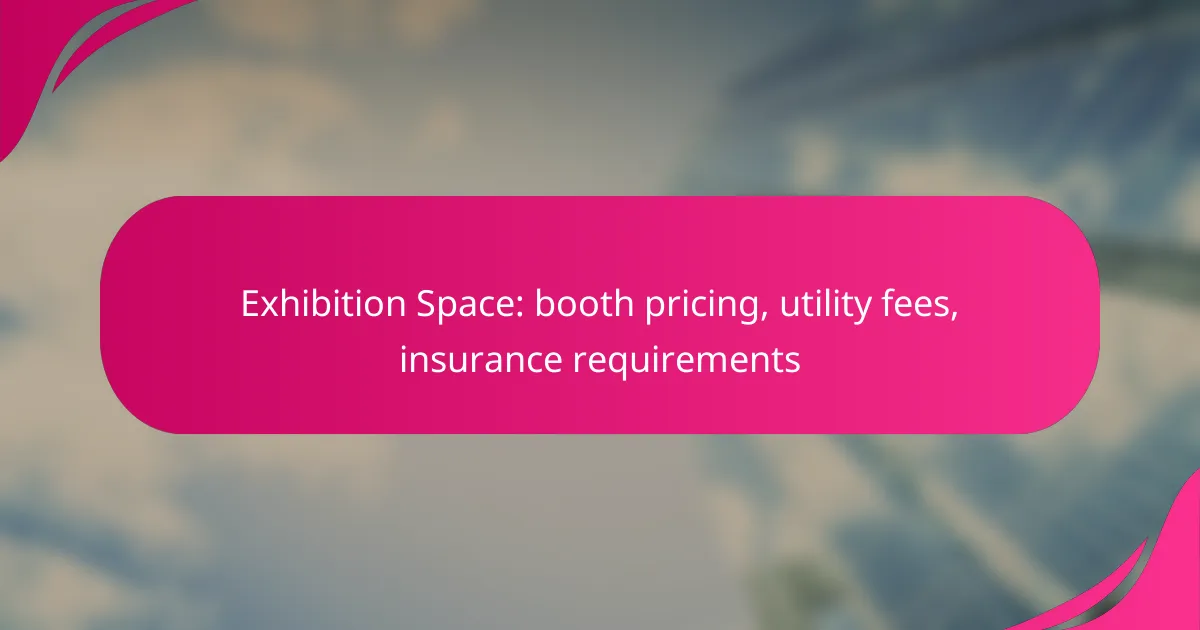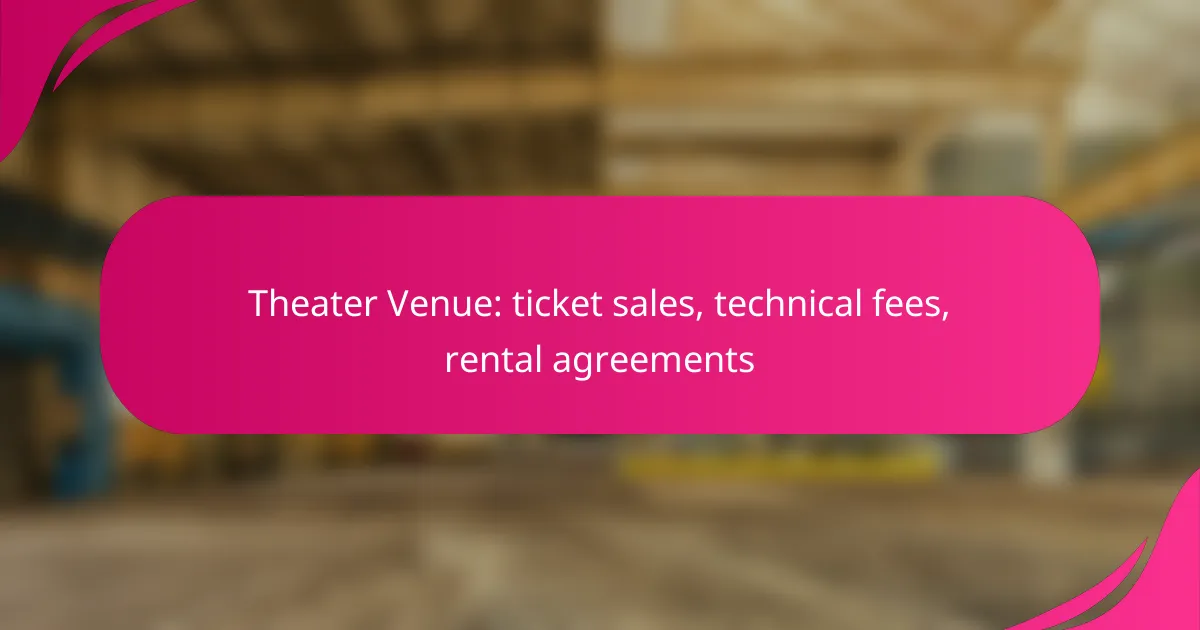Community centers in London offer a range of hourly rates, typically between £20 and £50, influenced by the facility’s amenities and the nature of the event. A deposit is usually required to confirm your booking, ensuring commitment and covering potential damages. Additionally, many centers provide extra services such as catering, audio-visual equipment rental, and event planning support to facilitate successful gatherings.
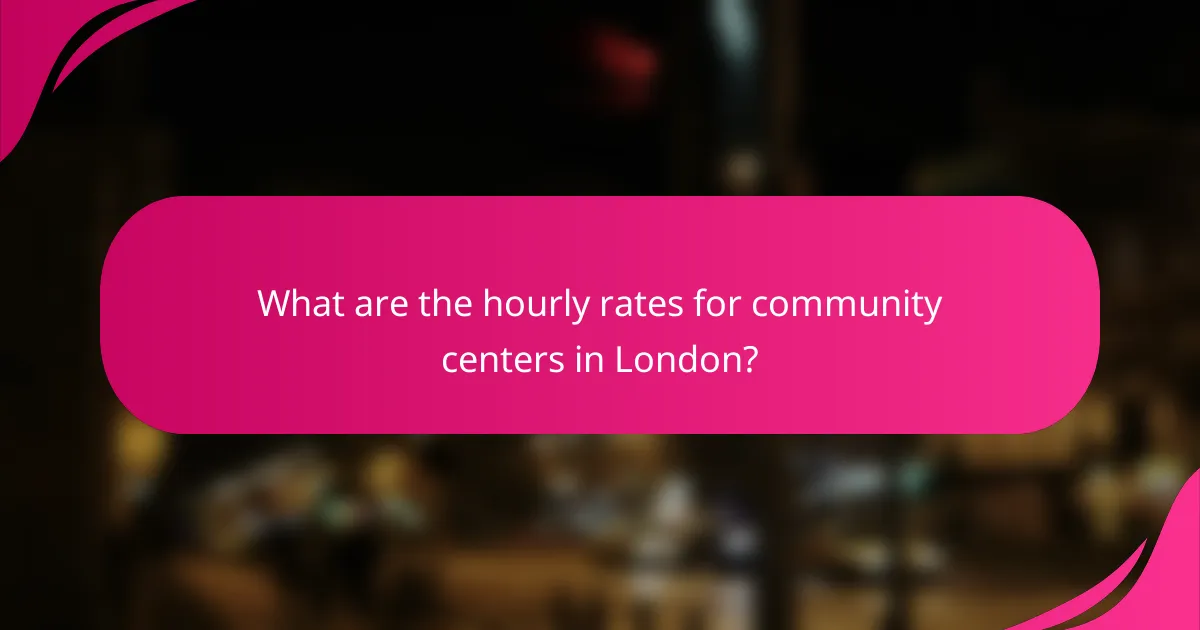
What are the hourly rates for community centers in London?
The hourly rates for community centers in London typically range from £20 to £50, depending on the facility and its amenities. Rates may vary based on the type of event, time of day, and additional services requested.
Standard hourly rate
The standard hourly rate for renting a community center in London usually falls between £20 and £40. This rate often includes basic amenities such as tables, chairs, and restroom access. It’s advisable to check specific centers for their exact pricing and included features.
Some community centers may charge additional fees for equipment like projectors or sound systems, so clarify these details when making a booking.
Discounted rates for non-profits
Many community centers in London offer discounted rates for non-profit organizations, which can be significantly lower than standard rates. Discounts typically range from 10% to 50%, depending on the center’s policies and the nature of the event.
To qualify for these rates, non-profits usually need to provide proof of their status, such as a registration number or a letter of verification. It’s best to inquire ahead of time to ensure you meet all requirements.
Peak vs. off-peak pricing
Community centers often implement peak and off-peak pricing to manage demand. Peak hours, typically evenings and weekends, may cost more—often £5 to £15 extra per hour—compared to off-peak times during weekdays.
Booking during off-peak hours can lead to substantial savings, making it a practical option for events with flexible timing. Always check the specific center’s schedule to determine peak and off-peak times before planning your event.
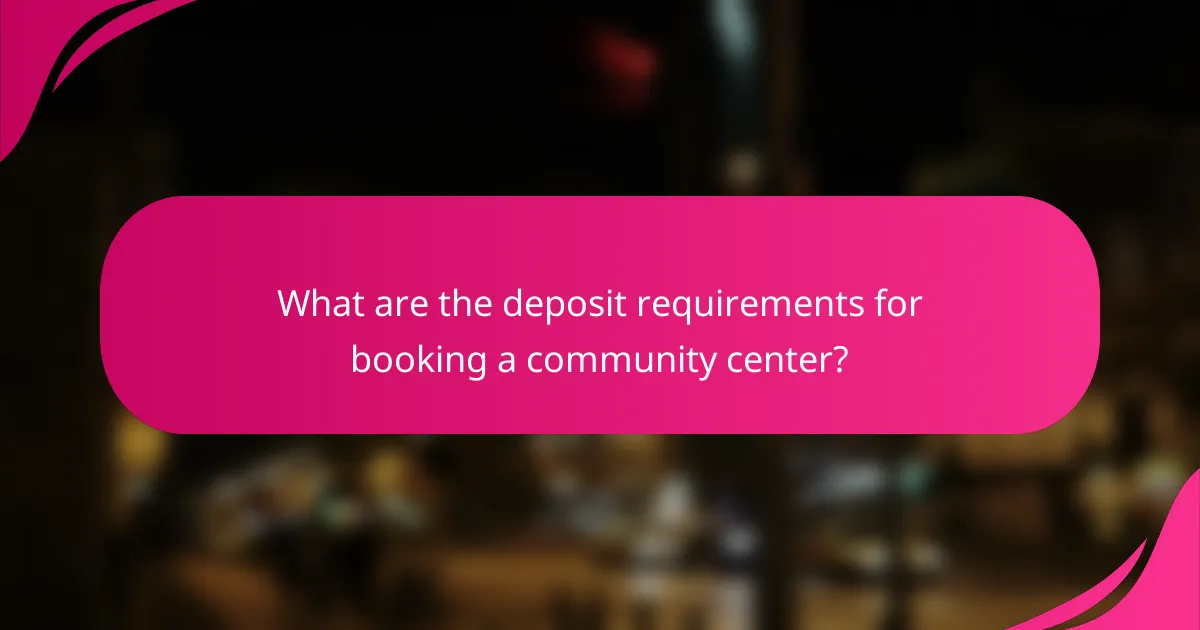
What are the deposit requirements for booking a community center?
To book a community center, a deposit is typically required to secure the reservation. This deposit ensures commitment from the renter and covers potential damages or cancellations.
Typical deposit percentage
The typical deposit for booking a community center usually ranges from 20% to 50% of the total rental fee. This percentage can vary based on the center’s policies and the size of the event. It’s advisable to confirm the exact percentage with the facility when making a reservation.
Refundable vs. non-refundable deposits
Deposits can be either refundable or non-refundable, depending on the community center’s terms. Refundable deposits are returned after the event, provided there are no damages or policy violations. Non-refundable deposits, on the other hand, are retained by the center if the booking is canceled.
When booking, carefully review the deposit terms to understand the implications of cancellation. For instance, if you anticipate changes to your plans, opting for a refundable deposit may offer more flexibility.
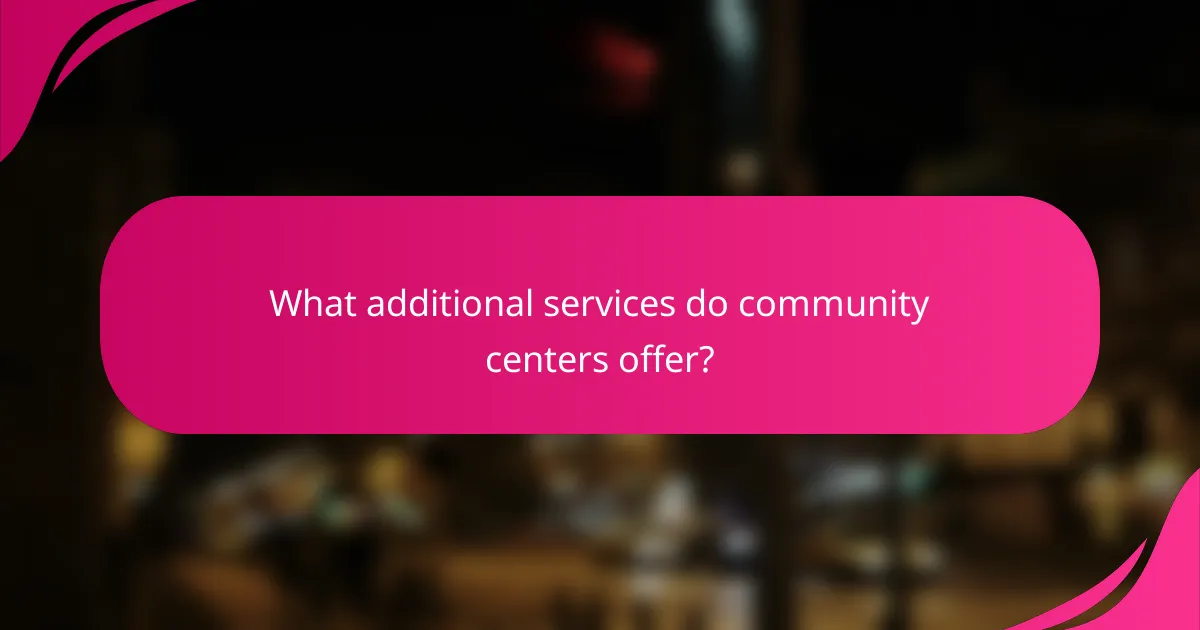
What additional services do community centers offer?
Community centers often provide a variety of additional services to enhance events and gatherings. These services can include catering options, audio-visual equipment rental, and event planning assistance, making it easier for organizers to host successful activities.
Catering options
Many community centers offer catering services or partnerships with local catering companies. This can range from simple snack trays to full meal packages, accommodating various dietary needs such as vegetarian, vegan, or gluten-free options.
When considering catering, it’s important to check the center’s policies on outside food and beverage. Some centers may require you to use their in-house catering services or charge a fee for external vendors.
Audio-visual equipment rental
Community centers typically provide audio-visual equipment for rent, including projectors, microphones, and sound systems. This equipment is essential for presentations, performances, or any event requiring multimedia support.
Before renting, inquire about the availability and compatibility of the equipment with your devices. Some centers may offer technical support during your event, which can be beneficial for ensuring everything runs smoothly.
Event planning assistance
Event planning assistance is another valuable service offered by community centers. Staff can help with logistics, layout design, and scheduling, ensuring that your event meets your expectations.
Utilizing event planning assistance can save time and reduce stress. Be sure to discuss your specific needs and any budget constraints upfront to receive tailored support that aligns with your vision.
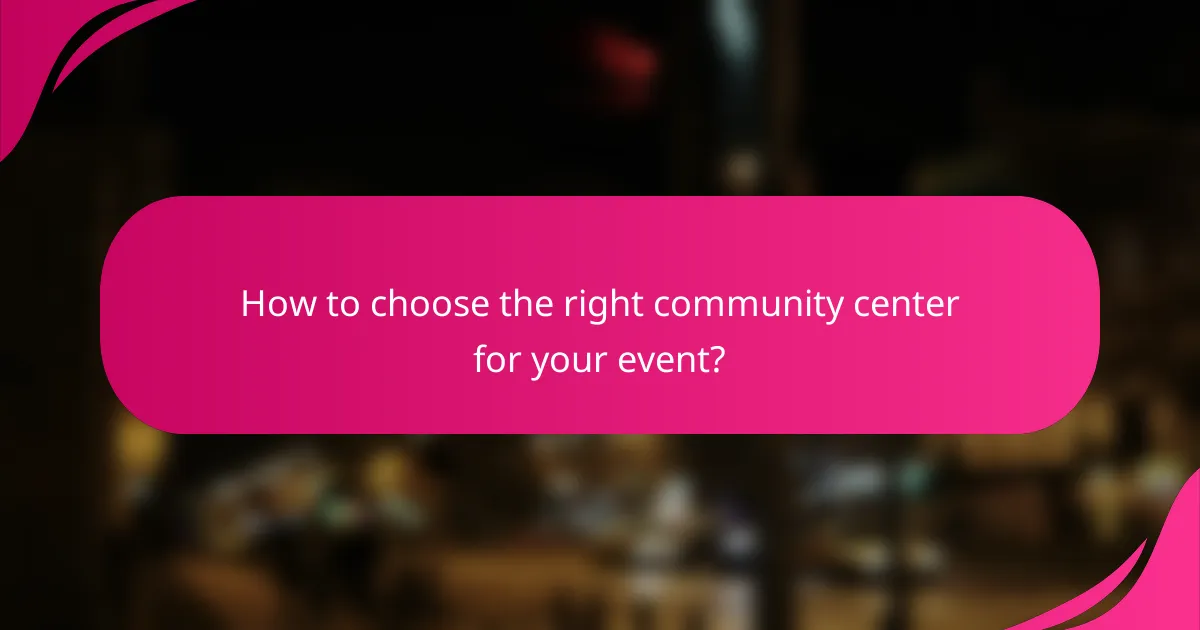
How to choose the right community center for your event?
Choosing the right community center for your event involves considering location, amenities, and capacity. These factors will help ensure that the venue meets your needs and enhances the overall experience for your guests.
Location considerations
Location is crucial when selecting a community center. Look for a venue that is easily accessible for your attendees, ideally situated near public transportation or major roadways. Consider the surrounding area for parking availability and safety.
Additionally, think about the neighborhood’s appeal. A community center in a vibrant area may attract more participants, while a remote location could deter attendance. Evaluate the proximity to hotels or accommodations if your event draws visitors from outside the area.
Facility amenities
Examine the amenities offered by the community center. Essential features might include audio-visual equipment, kitchen facilities, and restrooms. Some centers provide tables and chairs, while others may require you to rent them separately.
Check for additional services such as catering options, on-site staff, or cleaning services. These can significantly impact your event’s logistics and overall experience. Make a list of must-have amenities to ensure the venue aligns with your event’s requirements.
Capacity and layout options
Understanding the capacity and layout options of a community center is vital for planning your event. Ensure the venue can comfortably accommodate your expected number of guests, with room for movement and activities.
Explore different layout configurations, such as theater, banquet, or classroom styles. Each layout serves different purposes and can affect the atmosphere of your event. Request a floor plan to visualize how your event will fit within the space and make adjustments as necessary.
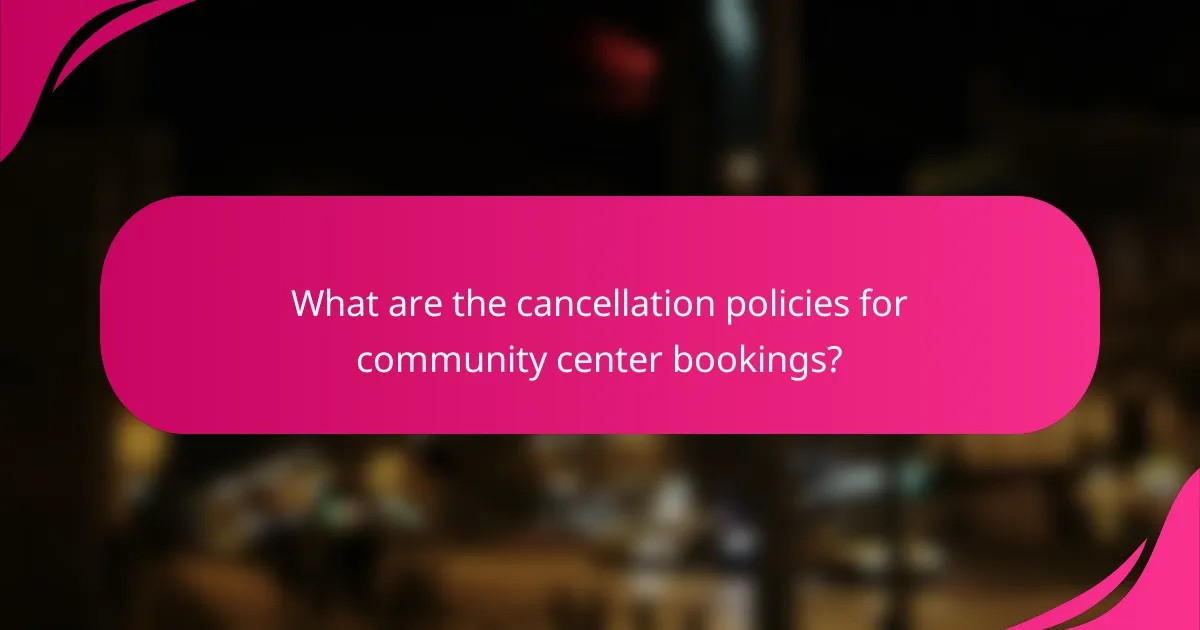
What are the cancellation policies for community center bookings?
Cancellation policies for community center bookings typically involve fees and notice requirements that vary by facility. Understanding these policies can help you avoid unexpected charges and ensure a smooth booking experience.
Standard cancellation fees
Standard cancellation fees at community centers usually range from a small percentage of the total booking cost to a fixed amount, depending on how close to the event date the cancellation occurs. For example, canceling more than two weeks in advance might incur a nominal fee, while cancellations made within a week could result in losing the entire deposit.
It’s advisable to check the specific community center’s policy, as fees can differ significantly. Some centers may offer a grace period or waive fees under certain circumstances, such as emergencies.
Notice period for cancellations
The notice period required for cancellations often ranges from 48 hours to two weeks before the scheduled booking. Providing notice within this timeframe is crucial to avoid penalties and to allow the center to fill the slot with other bookings.
For instance, if you need to cancel a reservation for a weekend event, notifying the center at least a week in advance is generally recommended. Always confirm the specific notice period with the community center to ensure compliance with their policies.
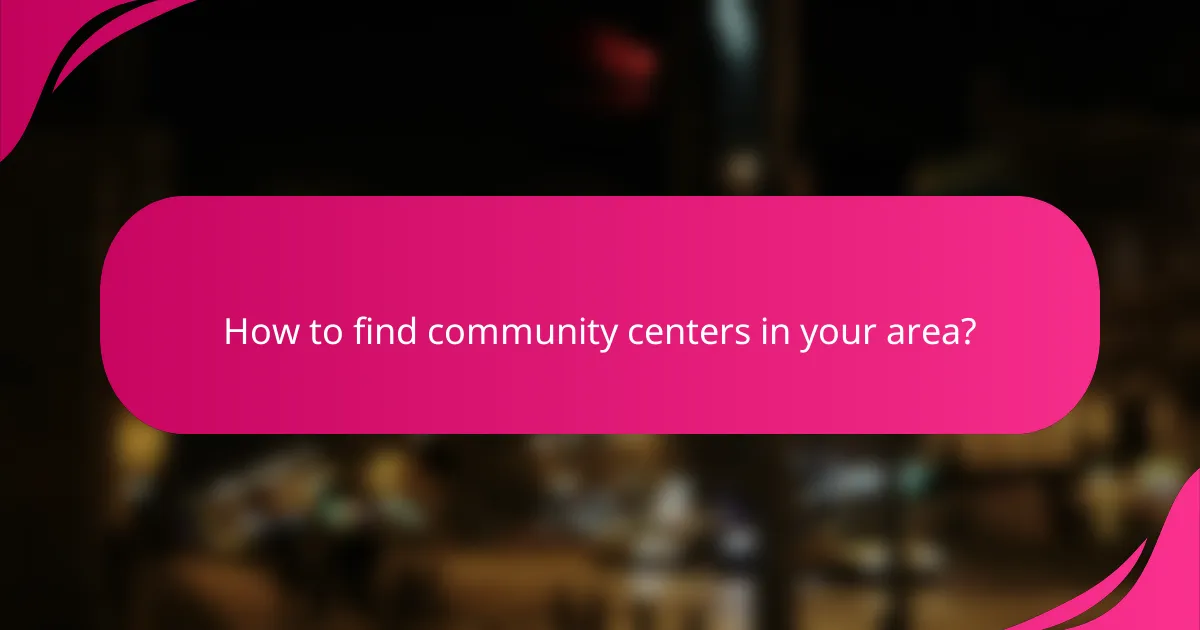
How to find community centers in your area?
To find community centers in your area, start by utilizing online resources, local government websites, and personal recommendations. These methods can help you identify available facilities, their services, and any associated costs.
Online directories
Online directories are a convenient way to locate community centers. Websites like Yelp, Google Maps, or specialized community service platforms allow you to search by location and filter results based on amenities offered.
When using these directories, pay attention to user reviews and ratings, as they can provide insights into the quality of services and facilities. Look for centers that list their hourly rates and any additional services they offer.
Local government resources
Your local government’s website is a valuable resource for finding community centers. Many municipalities maintain updated lists of public facilities, including details on rental rates, deposit requirements, and available services.
Check for any community newsletters or bulletins that may highlight upcoming events or programs at these centers. This information can also help you gauge the popularity and usage of specific locations.
Community recommendations
Asking friends, family, or neighbors for recommendations can lead you to lesser-known community centers that may not be listed online. Personal experiences often provide insights into the atmosphere and suitability of a center for your needs.
Consider joining local social media groups or forums where community members discuss their experiences with various centers. This can help you gather opinions and find the best options based on your specific requirements.
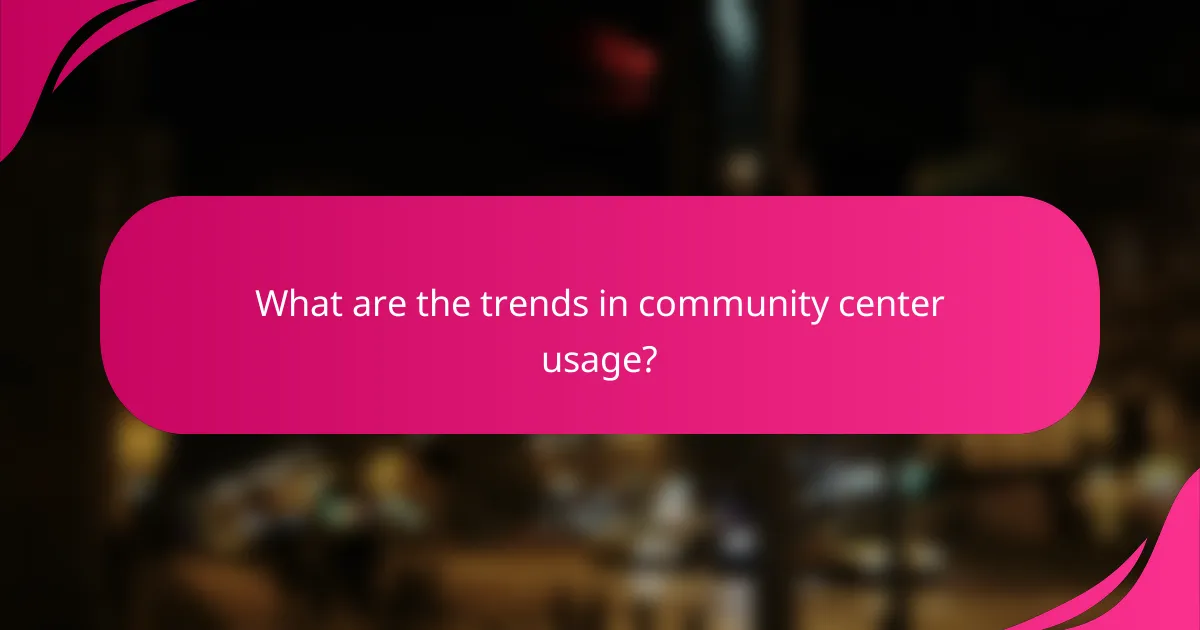
What are the trends in community center usage?
Community center usage is increasingly popular, reflecting a growing interest in local engagement and social activities. Many centers are adapting to meet diverse community needs, offering a variety of programs and services to attract a wider audience.
Hourly rates
Hourly rates for community center rentals typically vary based on location, facility type, and time of day. In general, rates can range from around $20 to $100 per hour, with discounts often available for residents or non-profit organizations.
When considering hourly rates, it’s essential to check if the fee includes amenities such as tables, chairs, and audio-visual equipment. Some centers may also offer package deals for longer rentals or multiple bookings.
Deposit requirements
Most community centers require a deposit to secure a reservation, which usually ranges from 20% to 50% of the total rental fee. This deposit is often refundable, provided there are no damages or cancellations outside of the specified notice period.
Be sure to review the specific deposit policies of your chosen center, as they may vary significantly. Understanding these requirements upfront can help avoid unexpected costs or complications.
Additional services
Community centers often provide additional services that can enhance your event, such as catering, event planning assistance, and access to recreational equipment. These services may come at an extra cost, so it’s advisable to inquire about them when making a reservation.
Consider the benefits of these additional services; they can save time and effort in planning your event. However, always compare the costs and quality of these services with external providers to ensure you are getting the best value for your needs.
